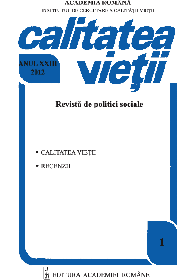Vârsta subiectivă şi adaptarea la îmbătrânire din perspectiva persoanelor vârstnice din Portugalia şi România: o analiză comparativă de corelație mult
Subjective age and adaptation to old age, from the perspective of elderly persons in Portugal and Romania: a comparative analysis of multiple correlat
Author(s): Isabel Leal, Filipa Pimenta, Corina Pânzaru, Mihaela Teodorescu, Georgeta Niculescu, Florentina Palada, Mihaela Tudosie, Irina Mihăilă, Nicoleta Spiru, Sofia von HumboldtSubject(s): Social Sciences
Published by: Editura Academiei Române
Keywords: Adjustment to Aging; Multiple Correspondence Analysis; Older Adults; Portuguese; Romanian; Subjective Age
Summary/Abstract: Purpose: To analyze the contributors of adjustment to aging (AtA) and subjective age (SA) identified by older adults and to investigate the latent constructs that can work as major determinants in AtA and SA in an older Portuguese and Romanian population. ATA includes both subjective and objective elements and it is a multidimensional function of the dynamic interaction of elements such as autonomy, control, self-acceptance, personal growth, positive social network, purpose in life (Bauer & McAdams, 2004; Keyes, Shmotkin & Ryff, 2002; Ryff, 1989; Ryff & Keyes, 1995) and generativity (Erikson, Erikson, & Kvinick, 1986) that may vary with time, age, gender, race, culture, illness, financial status and society (Neri, Cachioni, & Resende, 2002). Methods: Measures were completed, using a variety of culturally appropriate methods, including demographics and interviews. Complete data were available for 64 older adults aged between 72–99 years (M = 80.1; SD = 5.8), 32 adults from Romania and 32 from Portugal. Data was subjected to content analysis. Representation of the associations and latent constructs were analyzed by a Multiple Correspondence Analysis (MCA). Results: The most prevalent response of the interviewed participants for contributors to AtA was ‘Accomplishment, Personal Fulfillment, and Future Projects’ (24.1%). ‘With apprehension’ (33.3%) was identified as the most frequent SA response. Findings showed a model for each nationality. AtA and SA for Portuguese elderly were explained by a three-factor overall model: ‘conciliated’, ‘young-at-heart’ and ‘involved’. A three-dimension overall model formed by ‘satisfied’, ‘attentive’ and ‘concerned’ was indicated as a best-fit solution for Romanian elderly. Finally we can say that: SA is differently related to AtA in older adults in both samples. The findings presented in this paper highlighted the underdeveloped potential of an adjustment to age overall model for this population.
Journal: Calitatea vieţii
- Issue Year: XXIV/2013
- Issue No: 1
- Page Range: 3-14
- Page Count: 12
- Language: Romanian

